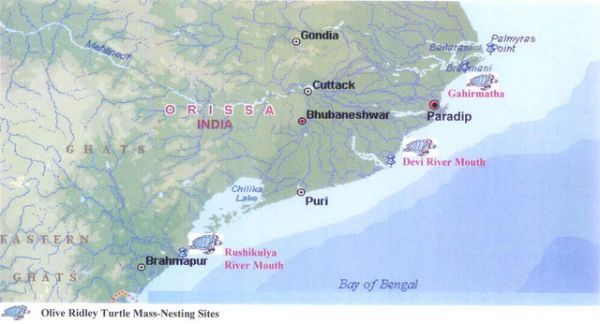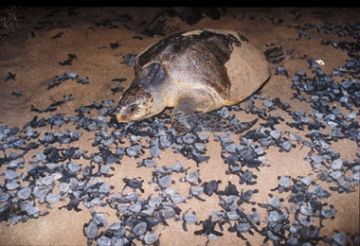Belinda Wright¹ and Biswajit Mohanty²
¹Belinda Wright is the Project Director of ‘Operation Kachhapa’ and the Executive Director of the Wildlife Protection Society of India. She has been involved in sea turtle conservation in Orissa since 1992.
²Biswajit Mohanty is the Project Coordinator of ‘Operation Kachhapa’ & the Secretary of the Wildlife Society of Orissa.
Introduction
The East Indian State of Orissa is one of only three sites in the world where the mass nesting of Olive Ridley turtles occurs. Three beaches in Orissa play host to this amazing natural phenomenon: the Nasi Islands inside Gahirmatha Marine Sanctuary, and the mouths of the Devi and Rushikulya rivers. In the early 1990s conservationists observed an increasing number of dead turtles being washed ashore along the Orissa coast. During the last ten years, over 100,000 dead adult Olive Ridley turtles have been recorded on these beaches.

Map Showing Turtle Mass-Nesting Sites on the Orissa Coast - Annexure 1.
Various factors have led to the mass mortality of turtles – in particular a surge in mechanised fishing, unsustainable fishing practices, and violations of the law that are further compounded by poor enforcement by the State government authorities. An estimated 16,000 fishing boats operate along the Orissa coast, of which about 8,000 are large mechanised fishing trawlers and gill-netters. Unfortunately the peak fishing season coincides with the arrival of the turtles in the months of October and November. The turtles are air breathers and drown when they get trapped and entangled in the trawler and gill nets.
The Wildlife Protection Society of India (WPSI) launched ‘Operation Kachhapa’ – kachhapa is the Oriya word for turtle – in 1998. The programme is run in close cooperation with the Wildlife Society of Orissa and the Orissa State Forest Department. The aim of Operation Kachhapa was to attempt to reduce turtle mortality and safeguard the future of the species by concentrating on three main activities:
- the prevention of turtle mortality by improving patrolling of the ‘no fishing zones’ and protection of nesting sites;
- supporting legal action on turtle conservation issues and fishing law violations; and
- building up public support and awareness of sea turtle conservation issues, including sensitising the media, the enforcement agencies and the judiciary about the large-scale turtle deaths.
Operation Kachhapa activities
Support for enforcement efforts
Enforcement of the fisheries laws ultimately lies with the authorities. Operation Kachhapa has assisted the Orissa State government by hiring patrol boats and donating fuel and equipment for patrol staff, and by serving as a co-ordinator for the various government and non-government agencies involved in turtle protection. Operation Kachhapa personnel remain in regular contact with all these agencies.
Sea-going patrol boats and a smaller support boat were hired for the Forest Department to patrol the Gahirmatha Marine Sanctuary and adjoining high-density turtle areas during the turtle seasons of 1998 to 2002 (a turtle season lasts from October to May). In addition, fuel for the boats, medical requirements for the crews and equipment such as life jackets, life buoys, blankets, mosquito nets, groundsheets and torches were provided. A spotting scope, GPS unit, spotlight, nightscope and binoculars were also supplied for the patrol vessels. From the 2002-03 turtle season, patrol boats (two large boats and one smaller boat) have been provided by the Department of Fisheries. Unfortunately they were slow and incapable of the speed required for effective patrolling. Operation Kachhapa personnel still regularly accompanied the Forest staff on patrols.
Over the years, the Indian Coast Guard has intensified its support for turtle conservation efforts off the coast of Orissa by carrying our regular sea patrols every turtle season. They have been responsible for the seizure of a large number of vessels operating illegally within the restricted fishing zones. Since the 1998-99 turtle season more than 300 trawlers and gill-netters have been seized by the Coast Guard and Forest Department manned Operation Kachhapa patrol boats, while hundreds more were scared away by their presence. Improved patrolling and enforcement during the 2001-2002 turtle season successfully brought down turtle mortality within the Gahirmatha Marine Sanctuary by over 60% from the previous year.
In October 1999, a massive cyclone devastated the Orissa coast. Operation Kachhapa immediately put its four-wheel-drive vehicle and staff towards community relief efforts; they were the first to reach a number of isolated fishing villages. These efforts greatly helped strengthen the relationship between Operation Kachhapa and local fishing communities.
Turtle conservation efforts in Orissa received a setback in February 2003, when three forest guards were abducted by crew members of a gill-netter that had been seized. One of the forest guards resisted and was pushed overboard. His body was washed ashore the next day. Operation Kachhapa immediately provided funds and support for the funeral arrangements and made an ex gratia payment to his family. After this unfortunate incident, the Forest staff refused to go on patrols unless accompanied by armed police personnel.
Turtle monitoring and protection
Since the 1998-99 turtle season, Operation Kachhapa has funded field camps at various locations along the Orissa coast to monitor turtle mortality and fishing vessel activities as well as to provide logistical support to turtle researchers. The monitoring of turtle mortality is done by walking the coastline to count turtle carcasses that have been washed ashore. The counts are carried out at regular intervals and each carcass found is marked with a number to avoid duplication. From 1993 to 2004 Operation Kachhapa has recorded 105,382 dead Olive Ridley turtles along the Orissa coast (Fig. 1).

Figure1: Turtle Mortality along the Coast of Orissa
Operation Kachhapa field staff have also been keeping records on daily sightings of illegal trawlers and gill-netters that operate off shore near the Devi River mouth and Rushikulya River mouth turtle nesting sites. Illegal night fishing by trawlers (which is particularly detrimental to sea turtles) is also prevalent, and unfortunately is not being checked by the authorities. The recorded figures are passed on to the authorities, with a request to enhance both day and night patrolling. As a result of these efforts, some additional patrolling was carried out at both sites. Operation Kachhapa hires additional local personnel every season, during and following the nesting of turtles, to provide protection to the nest sites and to carry out hatchling rescue and release operations. In some areas, nests have to be protected from predators such as village dogs, jackals, crows and gulls, and also tourists on the beaches. The staff worked in shifts to safeguard the nests.
The Rushikulya nesting beach is perilously close to local settlements and a National Highway, and artificial lights are visible from the beach. As sea turtles are highly sensitive to light, this has had tragic consequences for the hatchlings. When hatchlings emerge, they find the sea by locating the brighter horizon, which is usually moonlight or starlight reflecting off the sea surface. In Rushikulya, hundreds of thousands of tiny hatchlings are attracted towards the artificial lights, and head the wrong way and perish. In the first few seasons, Operation Kachhapa hired extra workers and organised volunteers to rescue hatchlings and release them near the waterline. During the current and last season 1.2 km of mosquito netting (half of which was provided by Operation Kachhapa and half by the Forest Department) was erected to stop the hatchlings moving away from the sea towards artificial lights. This method has proved to be extremely effective.
Legal Assistance
Operation Kachhapa is supporting a number of legal initiatives related to the conservation of the Olive Ridley. These include a Public Interest Litigation (PIL) in the High Court of Orissa regarding encroachment and illegal prawn farms in Bhitarkanika National Park. An objection has also been filed to a proposed crude oil terminal off Rushikulya and to the announcement by the Orissa Government that a large container port is to be constructed on the banks of the Dhamra. The site is directly opposite Bhitarkanika National Park and close to the turtle mass-nesting site at Nasi I and II Islands in Gahirmatha. The judiciary in Orissa has been extremely supportive of efforts to protect the State’s wildlife and environment and has given a number of positive directions.
Using detailed information provided by Operation Kachhapa, a further petition was filed in New Delhi before the Central Empowered Committee that was set up by the Supreme Court of India. The petition asked the Orissa State Government to enforce the fishing limits and the compulsory use of TEDs (Turtle Exclusion Device), to protect turtle nesting beaches from casuarina plantations, curtail development activities harmful to the turtles and to pass any other necessary orders for the protection of sea turtles. The Committee has taken a keen interest in the case. Directions have been issued ordering the Orissa Government to set up turtle protection camps, to hire boats for patrolling, to provide armed police support to the Forest Department, and to restrict detrimental development activities. This case is still in progress.
Turtle conservation awareness
Operation Kachhapa has successfully managed to focus attention on the sea turtles of Orissa, nationally and internationally. It is the main agency in the state that the public and the media turn to for information on sea turtle activity. Apart from providing enforcement and mortality information to the authorities, it holds regular meetings with the media, and has launched a number of publicity campaigns. Operation Kachhapa has also established a Turtle Interpretation Centre in the state capital city of Bhubaneshwar.
The aim of Operation Kachhapa’s turtle conservation awareness activities is to highlight the threats faced by the Olive Ridley, and to gain support for conservation measures to protect this endangered species. Most of the activities are planned to win the support of the local people who reside along the Orissa coast. Operation Kachhapa has organised rallies by students, village theatre shows, quiz competitions, performances by wandering minstrels, talks and video screenings, and has distributed posters, brochures, stickers, t-shirts and caps. It has put up hoardings and wall paintings and put out newspaper advertisements in an effort to spread awareness about the threats to the Olive Ridley and to garner support for their long-term protection.
To increase awareness among decision-makers in Orissa about the state’s natural heritage, Operation Kachhapa’s Project Coordinator regularly meets and lobbies with Ministers, Members of the Legislative Assembly and senior government officers about the problems related to sea turtle conservation and the protection measures that need to be implemented. Operation Kachhapa’s newsletter, ‘Kachhapa’, has developed over the years from a local circular to an international bulletin. Apart from carrying news about Olive Ridley turtles in Orissa and the activities of Operation Kachhapa, the publication also provides information about sea turtles from around India and Southeast Asia.
In November 2002, WPSI hosted the world premiere in New Delhi of 'The Ridley’s Last Stand', a film by well-known filmmaker Shekhar Dattatri. This disturbing film provides a well-informed and penetrating assessment of a tragedy that occurs on the Orissa coast every year. Operation Kachhapa has also distributed over 350 copies of a shorter 17-minute version of the film to gain support for sea turtle conservation in Orissa.
Acknowledgements
The Barbara Delano Foundation has generously funded Operation Kachhapa’s activities over the past four years. The Ford Motor Company has given a grant for the Sea Turtle Interpretation Centre and the Hong Kong and Shanghai Banking Corporation has supported education and awareness activities. The British Chelonia Group gave a grant to support the Devi River Mouth camp for the 2003-2004 turtle season.
Testudo Volume Six Number Two 2005
Top



